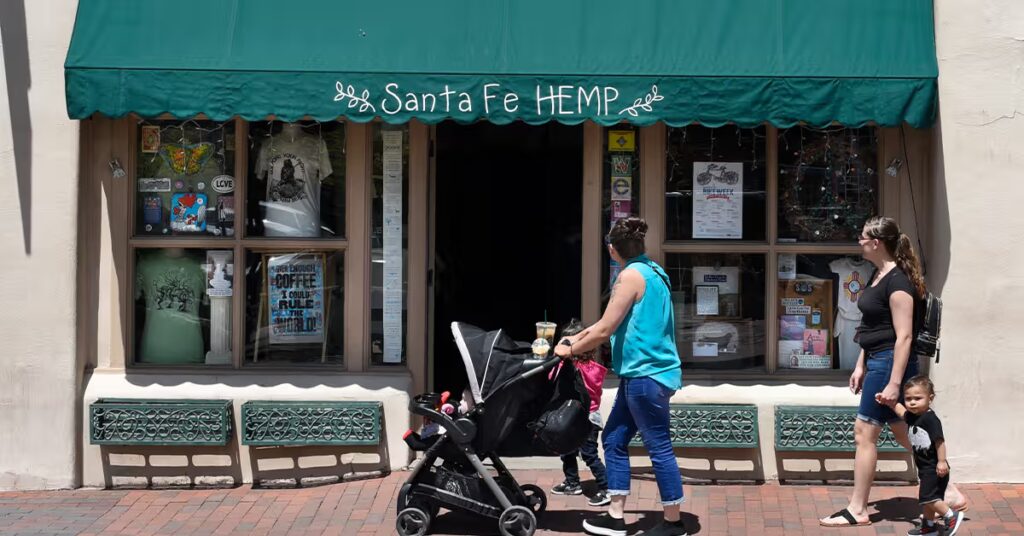Image credit: Robert Alexander/Getty Images
- A provision in the recent federal spending bill would ban a wide range of hemp-derived cannabinoid products starting in November 2026.
- The proposal closes the hemp “loophole,” stemming from the 2018 Farm Bill, and potentially reshapes a $28 billion industry.
- Advocates warn that the ban could limit access and push many toward riskier, unregulated alternatives.
A provision in the spending bill that ended the federal government shutdown earlier this month would ban hemp-derived cannabinoid products.
The ban would take effect one year after the bill’s passage, in November 2026.
States with established recreational and medical cannabis regulations are expected to be less affected by the ban.
Meanwhile, states like Texas and Kentucky, which have robust hemp industries but no recreational cannabis programs and only limited medical cannabis access, may bear the brunt.
Advocates for the cannabis and hemp industries say regulation is preferable to an outright ban.
“By seeking to recriminalize this market rather than regulate it, lawmakers chose to utilize a sledgehammer when they should have used a scalpel,” Paul Armentano, deputy director of the National Organization for the Reform of Marijuana Laws (NORML), told Healthline.
“Banning the hemp-derived products market will not decrease consumers’ demand for these products, nor will it increase consumers’ safety. Instead, it will deny many consumers who previously relied on these products, including those who did so for therapeutic purposes, from legally accessing them in the future.”
Those sentiments were echoed by Matt Kennicott, executive director of the Cannabis Association of New Mexico, who told Healthline, “Banning things really ends up sending consumers back to the black market. Regulating is a much safer option.”
The bill effectively closes the hemp “loophole” stemming from the 2018 Farm Bill. That piece of legislation crafted a definition for hemp separate from cannabis.
Delta-9 THC is the most abundant, intoxicating chemical compound found in cannabis.
Marijuana and hemp are both varieties of the cannabis plant, but they are chemically different. While hemp contains less than 0.3% THC, marijuana contains much more.
The designation outlined in the Farm Bill reclassified hemp as an agricultural product; meanwhile, marijuana remains an illegal Schedule 1 drug. The broad definition allowed for shrewd businesspeople to craft and sell cannabis-adjacent products legally.
“That created this massive market for products like CBD and then delta-8 based on this definition,” said Daniel Kruger, PhD, a research associate professor at the University at Buffalo, who specializes in medical cannabis.
“These are products that you can often get at smoke shops or at gas stations. You can order them online. They’re most popular in states that don’t have a legalized pathway to cannabis, so people are using them as a workaround,” said Kruger.
With an updated definition to what constitutes hemp and broad language targeting intoxicating cannabinoids, lawmakers have effectively closed the hemp loophole.
The spending bill provision makes radical changes to how hemp is defined at the federal level.
The new definition states that hemp may contain no more than 0.4 milligrams of total THC per container. A “container” is defined as the “innermost wrapping, packaging or vessel in direct contact with a final hemp-derived cannabinoid product.”
Additionally, cannabinoids that are synthesized or manufactured outside of the plant, will be banned. The wording, again, is somewhat ambiguous.
Delta-8 and delta-9 THC, for example, do naturally occur in cannabis, but in small quantities. In order to commercialize, delta-8 THC producers utilize a form of chemical synthesis, during which it is converted from CBD.
One section of the bill that has drawn significant scrutiny is the provision banning cannabinoids with “similar effects” to THC. The vague language could give lawmakers wide latitude to regulate a broad range of compounds.
The FDA must issue clarifying guidance within 90 days, including a list of cannabinoids that fall under the “similar effects” clause.
CBD is non-intoxicating and should, hypothetically, be free of THC, though that isn’t always the case.
Some forms of CBD products, known as “full-spectrum,” typically include a small amount of THC and other cannabinoids. Such products could be banned.
The bill’s updated definition of hemp and its broad limits on total THC would sweep up many CBD products from the legal market, especially full-spectrum formulations that contain other cannabinoids, often THC.
Even products labeled “THC-free” could be impacted if testing reveals minimal amounts of THC or synthesized cannabinoids, making their future availability uncertain. These products may not be safe due to a lack of regulation and poor quality control.
“There’s some products that may have a minimal amount of THC and it turns out that they actually have a lot more than that,” said Kruger.
A 2023 study found that CBD products frequently contained small amounts of THC, even when they explicitly claimed the opposite.
Recreational and medical cannabis will only be affected by the ban in states that have not made recreational or medical cannabis legal.
Experts say the availability of affected products could potentially be impacted.
“Anytime you do something that restricts the medicine that’s helping someone, there’s always a concern there,” said Kennicott.
For those without access to medical marijuana, hemp-derived delta-8 and delta-9 THC products are a likely alternative.
Delta-8 and other hemp-derived cannabinoid products are not without criticism either.
The FDA has reported an increase in adverse events related to the products and warned consumers about the use of harmful chemicals during processing.
A 2022 study found that tested delta-8 THC contained numerous chemical impurities “with unknown effects on the human body.”
However, advocates argue that regulating, rather than banning, these products will bring greater clarity to the industry and safety to consumers.
“Regulation equals a safer and probably more enjoyable experience for consumers and patients alike. We would much rather see these products regulated than outlawed,” said Kennicott.
Source link : https://www.healthline.com/health-news/federal-ban-hemp-thc-products-could-limit-cbd-access
Author :
Publish date : 2025-11-21 11:56:16
Copyright for syndicated content belongs to the linked Source.
